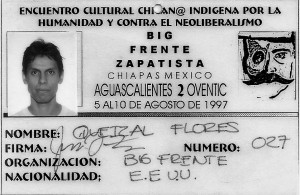About
 Bio
Bio
I am a Chicano Artivista born in Salinas, CA and raised in North East LA. My parents are social justice activists Consuelo Valdez and Roberto Flores. The family moved to Los Angeles in 1976 so that my parents could join the August 29th Movement. I attended Gates St. Elementary, El Sereno Jr High, Wilson Medical Magnet (Pre- Bravo) and Alhambra High. My love affair with playing music began when I was 13 and my brother came home from boarding school with an electric guitar. Holding the instrument in hands instantly transported me into multiple realms of possibilities. My first mentor was Ruben Reza, a local guitar virtuoso. In 1993, under the sanctuary of a powerful music scene out of a tiny Chicano owned cafe in Little Tokyo, I founded the East Los Angeles based rock group Quetzal. From the experiences generated through the band and community struggles, I have participated in multiple moments of radical transformation.
Zapatista Movement
In 1997, as a founding member of East LA based Big Frente Zapatista (BFZ) I co-organized the Encuentro Cultural Por La Humanidad y En Contra del Neoliberalismo, a 5 day retreat in Oventic a prominent Zapatista Community. Over one hundred artivists and community from Los Angeles and hundreds of Zapatistas participated in dialogue, art workshop and celebration around themes essential to thriving in our communities. This was the first time I witnessed a collective songwriting workshop facilitated by singer/songwriter and activist Rosa Marta Zarate. This had a tremendous impact on me as it modeled a way for me to use composition, a skill that I possessed, to engage community in a critical and creative conversation. Through 20 years of development and practice, Collective Songwriting has become a signature pedagogy of the band Quetzal.
Fandango Movement
In 1995, I met Lorenzo “Lencho” Martinez, a community master musician who introduced me to traditional Mexican music and most importantly, the instruments. I was particularly taken by the jarana, an eight stringed rhythm guitar from the son Jarocho tradition in Veracruz, MX. Shortly after, I met Russell Rodriguez a master musician from San Jose, CA who introduced me to El Movimiento Jaranero, a group of musicians from Veracruz who beginning in the 1970’s created a movement to recover and proliferate the Fandango, a participatory music and dance practice that was in danger of disappearing. In 2002, myself together with many Chican@ artivistas travelled to Veracruz to begin a translocal dialogue with El Movimiento Jaranero that involved sharing cultural and economic resources across communities and borders. From this dialogue emerged many recordings, performances, publications, workshops, community building efforts and importantly transplanted the Fandango to East Los Angeles as a local sustainable community practice. This was important as it provided a tangible method for me to be in community with music and in music with community. In 2008 I co-founded the Seattle Fandango Project, a transgenerational community that practices the Fandango and has connected to other local and translocal communities of practice. In 2013 I co-founded FandangObon, a yearly convening of the Southern California Fandango, Obon, and West African music and dance communities.
Tradtional Arts
As the Southern California Program Manager for the Alliance for California Traditional Arts (ACTA) from 2012-2016 I spearheaded Activating Cultural Assets, a participatory cultural asset mapping project in Boyle Heights and the Eastern Coachella Valley. In collaboration with The California Endowment’s Building Healthy Communities initiative, this project relies on local traditional arts and culture systems to create programming that impacts the health and vitality of a community. In 2014, I began managing and curating the Arts in Corrections (AIC) program for ACTA. By programming traditional artists from communities of practice, ACTA’s AIC program offers a unique mobility and connection which provides a pathway towards healing and rehabilitation. From 2014-2017 the AIC program went from servicing 3 to 16 prisons statewide.
Community Development
In 2016 I joined the East Los Angeles Community Corp as the Director of Arts and Culture. Focusing on changing the DNA of the organization, I operate with the belief that Art & Culture are inseparable and symbiotic resources that live at the essence of community vitality and transformation. Art & Culture provoke critical analysis of our communities cultural convening practices as sites for the facilitation of power and cooperation.
Production
My goal is to serve as a resource to musicians from my community and like communities in the articulation of their lived realities through music production. My production method is informed by deep hanging out with my mentors, John Avila, Greg Landau, Steve Berlin and Robert Carranza. I believe that the key to any successful production is strong and transparent relationships. I spend a considerable amount of time with artists I’m producing in order to create a trust that allows the interrogation of lyrics, arrangement, tempo and dynamics.

